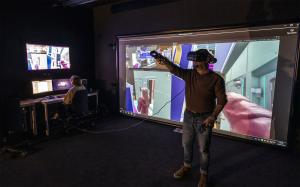DigITER : un projet au service du passé, du présent et de l'avenir
Le programme ITER a été mis en place dans le but de construire un grand tokamak qui permettra de démontrer la faisabilité de l'énergie de fusion. Son véritable « produit final » toutefois n'est pas la machine elle-même mais plutôt l'ensemble des connaissances accumulées tout au long du chemin. Au cours des 35 dernières années, depuis les activités de conception et d'ingénierie jusqu'à la construction, la fabrication, l'assemblage et la mise en service des premiers systèmes, ITER a généré un volume de données considérable. Des millions de documents ont été créés sur différents supports et structurés en fonction des méthodes et des technologies disponibles au moment où ils ont été produits. Pour convertir ces précieuses données en informations accessibles, une transition numérique radicale est aujourd'hui indispensable. Toutes les entreprises ou institutions engagées dans un projet à long terme sont confrontées à la même nécessité. À la fin de l'année 2021, un groupe de travail au sein d'ITER a élaboré une feuille de route pour cette transition et le projet DigITER a officiellement vu le jour à l'automne 2022.
Comme c'est le cas pour toutes les institutions et entreprises engagées dans des projets se déployant sur plusieurs décennies, les données d'ITER ont bien été préservées mais elles sont dispersées, ramifiées, fragmentées et parfois difficiles à localiser. À la fin de l'année 2021, le groupe de travail d'ITER a confronté son expérience à celles d'Airbus, de Rosatom, d'EDF et de l'institut coréen de l'énergie de fusion ; depuis, des contacts ont également été établis avec le CERN et avec Tesla. Toutes ces entités ont été confrontées au même défi, et toutes ont adopté une approche similaire : capturer les données et les stocker dans des référentiels structurés et centralisés. « Les capacités de stockage actuelles nous permettent de capturer chaque octet disponible, y compris les 'données subjectives' qui peuvent sembler sans intérêt aujourd'hui mais se révéler utiles demain. »
Alain Bécoulet utilise un exemple pour illustrer la notion de « données subjectives » : « Prenons le stylo à bille que vous utilisez pour prendre des notes. Nous pouvons restituer ses dimensions, son volume, etc. sous la forme d'un dessin 3D, ajouter des informations concernant le matériau et, la capacité de stockage n'étant pas un problème, intégrer des éléments historiques expliquant pourquoi la couleur bleue a été choisie pour le capuchon. Est-ce que c'est important ? Peut-être pas aujourd'hui. Mais un jour, pour une raison que nous ne pouvons anticiper, cela pourrait le devenir. C'est là tout l'enjeu des données subjectives et des métadonnées. En quelque sorte, cela revient à attacher une étiquette à un objet 3D. Et nous pouvons lui rattacher autant d'étiquettes que nous le souhaitons. »
L'exemple du capuchon de stylo peut être extrapolé à l'ensemble des éléments et systèmes d'ITER, quelle que soit leur taille ou leur complexité. Compte tenu de la capacité des outils numériques à capturer et à traiter d'énormes quantités de données, cette approche ouvre la voie à la création de « jumeaux numériques » pour l'ensemble des environnements d'ITER.
« Dans la salle de réalité virtuelle, nous avons aujourd'hui accès aux restitutions 3D des éléments et des systèmes de l'installation. Mais, à quelques exceptions près, ces restitutions représentent 'l'objet', ou le système, tel qu'il a été conçu et non pas tel qu'il a été réalisé, et sans métadonnées. Avec les technologies actuelles, il devient assez simple de scanner l'ensemble d'un environnement, de le recréer virtuellement tel qu'il est dans le monde réel et de le relier à des attributs subjectifs ».
L'intelligence artificielle devrait jouer un rôle central dans la transition numérique DigITER car elle offrira un outil privilégié pour « interroger » les bases de données et minimiser les risques d'erreur humaine. « Un processus qui fait intervenir des acteurs issus d'environnements et de cultures différents, chacun avec son mode de fonctionnement propre, est susceptible de générer des erreurs. Dans le cas d'ITER, comme pour toute entreprise d'une complexité et d'une envergure similaire, les conséquences peuvent être désastreuses. »
La disponibilité des connaissances repose sur l'accès à des données organisées, et c'est justement l'objet du projet DigITER. « La gestion des données est au cœur de ce type d'activité, souligne Alain Bécoulet. Maîtriser nos données, c'est maîtriser tout le reste. » Le projet de « continuité des données », qui vise à consolider la structure des données techniques d'ITER, est en cours d'élaboration. Une année complète sera nécessaire pour définir la nouvelle architecture, ainsi qu'une année supplémentaire pour effectuer ce qu'Alain Bécoulet appelle la « re-numérisation » de l'ensemble des données accumulées par ITER.
Dans le cadre des capacités actuelles d'ITER, trois actions, au sein du projet DigITER sont également considérés comme prioritaires : la numérisation des données de récolement et la construction de modèles 3D ; le développement du recours à la réalité virtuelle et à la « réalité augmentée » pour les activités de conception, de validation, de contrôle, de simulation et de formation ; et enfin l'introduction d'outils numériques pour la conception avancée du bâtiment cellule chaude.
« DigITER représente un volume de travail colossal, explique Alain Bécoulet, mais nous disposons aujourd'hui des outils nécessaires. » Après plus d'une année d'études approfondies et d'analyses comparatives et avec l'élaboration d'une feuille de route par le groupe de travail, la plateforme est maintenant prête à entrer en service.



